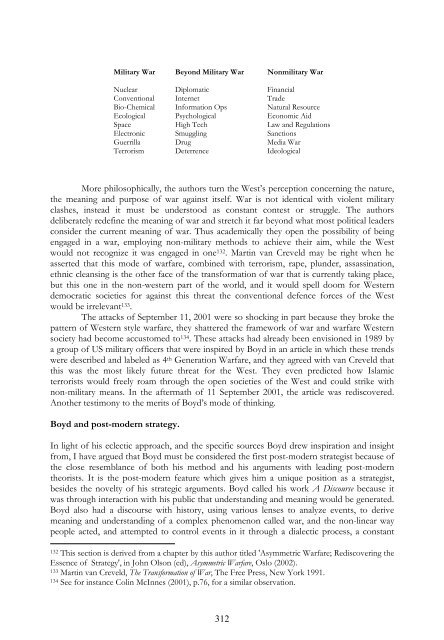Science, Strategy and War The Strategic Theory of ... - Boekje Pienter
Science, Strategy and War The Strategic Theory of ... - Boekje Pienter
Science, Strategy and War The Strategic Theory of ... - Boekje Pienter
You also want an ePaper? Increase the reach of your titles
YUMPU automatically turns print PDFs into web optimized ePapers that Google loves.
Military <strong>War</strong> Beyond Military <strong>War</strong> Nonmilitary <strong>War</strong>Nuclear Diplomatic FinancialConventional Internet TradeBio-Chemical Information Ops Natural ResourceEcological Psychological Economic AidSpace High Tech Law <strong>and</strong> RegulationsElectronic Smuggling SanctionsGuerrilla Drug Media <strong>War</strong>Terrorism Deterrence IdeologicalMore philosophically, the authors turn the West’s perception concerning the nature,the meaning <strong>and</strong> purpose <strong>of</strong> war against itself. <strong>War</strong> is not identical with violent militaryclashes, instead it must be understood as constant contest or struggle. <strong>The</strong> authorsdeliberately redefine the meaning <strong>of</strong> war <strong>and</strong> stretch it far beyond what most political leadersconsider the current meaning <strong>of</strong> war. Thus academically they open the possibility <strong>of</strong> beingengaged in a war, employing non-military methods to achieve their aim, while the Westwould not recognize it was engaged in one 132 . Martin van Creveld may be right when heasserted that this mode <strong>of</strong> warfare, combined with terrorism, rape, plunder, assassination,ethnic cleansing is the other face <strong>of</strong> the transformation <strong>of</strong> war that is currently taking place,but this one in the non-western part <strong>of</strong> the world, <strong>and</strong> it would spell doom for Westerndemocratic societies for against this threat the conventional defence forces <strong>of</strong> the Westwould be irrelevant 133 .<strong>The</strong> attacks <strong>of</strong> September 11, 2001 were so shocking in part because they broke thepattern <strong>of</strong> Western style warfare, they shattered the framework <strong>of</strong> war <strong>and</strong> warfare Westernsociety had become accustomed to 134 . <strong>The</strong>se attacks had already been envisioned in 1989 bya group <strong>of</strong> US military <strong>of</strong>ficers that were inspired by Boyd in an article in which these trendswere described <strong>and</strong> labeled as 4 th Generation <strong>War</strong>fare, <strong>and</strong> they agreed with van Creveld thatthis was the most likely future threat for the West. <strong>The</strong>y even predicted how Islamicterrorists would freely roam through the open societies <strong>of</strong> the West <strong>and</strong> could strike withnon-military means. In the aftermath <strong>of</strong> 11 September 2001, the article was rediscovered.Another testimony to the merits <strong>of</strong> Boyd’s mode <strong>of</strong> thinking.Boyd <strong>and</strong> post-modern strategy.In light <strong>of</strong> his eclectic approach, <strong>and</strong> the specific sources Boyd drew inspiration <strong>and</strong> insightfrom, I have argued that Boyd must be considered the first post-modern strategist because <strong>of</strong>the close resemblance <strong>of</strong> both his method <strong>and</strong> his arguments with leading post-moderntheorists. It is the post-modern feature which gives him a unique position as a strategist,besides the novelty <strong>of</strong> his strategic arguments. Boyd called his work A Discourse because itwas through interaction with his public that underst<strong>and</strong>ing <strong>and</strong> meaning would be generated.Boyd also had a discourse with history, using various lenses to analyze events, to derivemeaning <strong>and</strong> underst<strong>and</strong>ing <strong>of</strong> a complex phenomenon called war, <strong>and</strong> the non-linear waypeople acted, <strong>and</strong> attempted to control events in it through a dialectic process, a constant132 This section is derived from a chapter by this author titled 'Asymmetric <strong>War</strong>fare; Rediscovering theEssence <strong>of</strong> <strong>Strategy</strong>', in John Olson (ed), Asymmetric <strong>War</strong>fare, Oslo (2002).133 Martin van Creveld, <strong>The</strong> Transformation <strong>of</strong> <strong>War</strong>, <strong>The</strong> Free Press, New York 1991.134 See for instance Colin McInnes (2001), p.76, for a similar observation.312
















